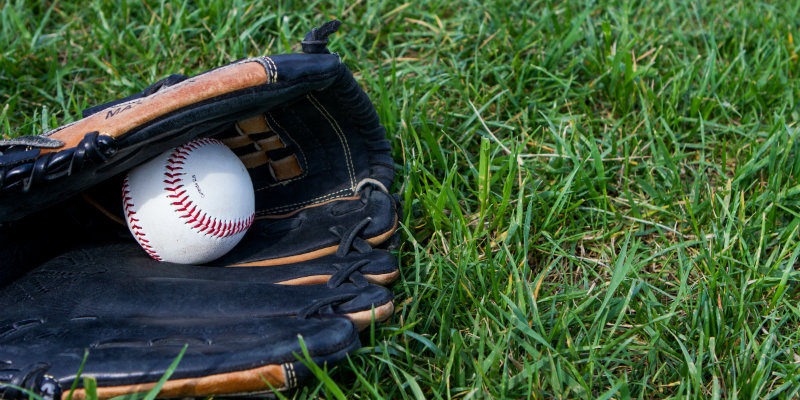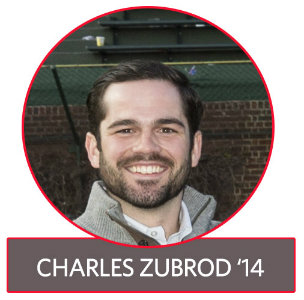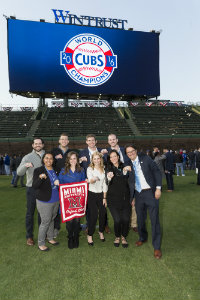Miami SLAM Alumni Build Exciting Careers in Major League Baseball


James M. Loy, Miami University
""I get excited when I can say that my worst day at work is when there's a night game, and I have to stay a little longer at Wrigley Field," says Charles Zubrod."That's not so bad."
Zubrod is a business development representative for the Chicago Cubs and he's a graduate of Miami University's Sport Leadership and Management (SLAM) program, where he learned to critically analyze and engage with the business and cultural sides of the sports industry.
He is also someone who clearly loves his job.
“The stars aligned for me,” Zubrod says. “I was born and raised in Chicago and grew up a Cubs fan, and when I went to Miami I knew I wanted to work in sports. I actually played baseball there. So the fit was right. And the SLAM major helped me learn that there are a lot of different things that you can do in sports.”
Most people intuitively understand that it takes more than just players and coaches to keep an organization running. But most probably don’t realize just how complex most operations really are.
Alongside a full coaching and consulting staff, most teams also support a legion of sport administrators, promotion specialists, analytics experts, sales representatives, facility managers, marketing directors and more who are all dedicated to a team’s success both on and off the field.
And through the SLAM program, offered by the College of Education, Health and Society, Miami students get access to the resources and experiences to help them thrive in these kinds of careers.
For Zubrod, this means working in a B2B capacity alongside local businesses who use Wrigley Field to entertain clients, vendors, and employees.
“My main focus is to cast a wide net over the Chicago market and make sure that Chicago companies are doing their entertainment events at Wrigley Field, rather than at other venues,” he says. “We want to be the place a Chicago company identifies and uses for a venue.”
For other alumni, a SLAM major can even mean working on what’s been called the next frontier of sports science, which treats the mind itself as another muscle that athletes can train and hone.
Over on the other side of the league, Chris Passarella serves as an associate director of mental conditioning for the New York Yankees, where he helps players optimize performance through a variety of visualization and mindfulness techniques.
“The mission behind our department is to relate how the mental aspects of the sport impact performance,” Passarella says. “On any given day, I am talking to coaches of players about their mentality and routines, their ability to use what they practice in games, and to reflect back on games where, or where not, their mindset might have impacted performance.”
Passarella and his team also employ similar techniques to evaluate the promise of potential draft picks.

Zubrod and fellow Miami alums
showing their World Series rings
“We are looking at unearthing every single tool of that baseball player’s package,” he explains. “Of course, they are scouting the physical end of things. And in concert, we are also drilling down on their mindset.”
Mental conditioning, often referred to as sports psychology, is just another way teams hope to gain an extra edge within an industry that has always thrived on competition. It is this struggle for dominance that motivates most athletes to achieve their very best and it’s one of the main drivers behind fan enthusiasm and loyalty.
But even behind the scenes, competition for most jobs across the sports industry can still be incredibly fierce. And both Zubrod and Passarella credit the merits of their Miami experience for helping them get to where they are today.
“I chose Miami because of the balance of theory and applied focus in their training,” Passarella says. “I also knew how much the faculty had actually been involved in the field of sports psychology. They had not only written books, but many were actually out in the field working with athletes. Miami’s academic and athletic resources combined to offer me an unmatched experience while getting my M.S.”
For Zubrod, it was more about the wide breadth of opportunities he explored and the new perspective he gained as a result.
“What I learned, something that is really pertinent in the sports industry, is you have to be open to any role or any experience possible,” says Zubrod. “When I did my practicum at Miami, I did a strength and conditioning internship that opened me to a whole new world about how much goes on behind the scenes to make sure that what you see on TV, or on the field, is the best product possible.”
“That experience,” he says, “gave me a greater appreciation for the sports industry.”

